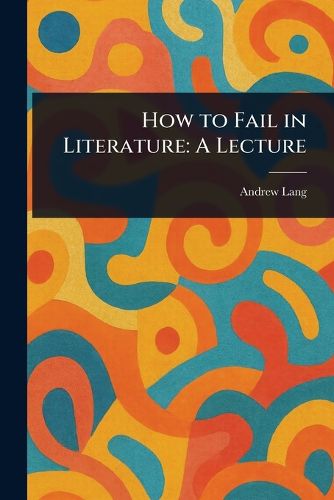Readings Newsletter
Become a Readings Member to make your shopping experience even easier.
Sign in or sign up for free!
You’re not far away from qualifying for FREE standard shipping within Australia
You’ve qualified for FREE standard shipping within Australia
The cart is loading…






This title is printed to order. This book may have been self-published. If so, we cannot guarantee the quality of the content. In the main most books will have gone through the editing process however some may not. We therefore suggest that you be aware of this before ordering this book. If in doubt check either the author or publisher’s details as we are unable to accept any returns unless they are faulty. Please contact us if you have any questions.
"How to Fail in Literature" by Andrew Lang is a witty and insightful collection of essays that brilliantly lampoons the world of literary criticism. This collection offers a delightful parody of common pitfalls and pretentious pronouncements found within the realm of literature. With keen satire, Lang examines various aspects of the literary landscape, providing humorous observations on how to achieve spectacular failure in the field. A master of literary humor, Lang offers a timeless perspective on the often-absurd world of books and those who critique them. This volume, meticulously prepared for print republication, promises a lighthearted yet thought-provoking exploration of literary follies, perfect for anyone with an appreciation for classic essays and sharp wit.
This work has been selected by scholars as being culturally important, and is part of the knowledge base of civilization as we know it.
This work is in the public domain in the United States of America, and possibly other nations. Within the United States, you may freely copy and distribute this work, as no entity (individual or corporate) has a copyright on the body of the work.
Scholars believe, and we concur, that this work is important enough to be preserved, reproduced, and made generally available to the public. We appreciate your support of the preservation process, and thank you for being an important part of keeping this knowledge alive and relevant.
$9.00 standard shipping within Australia
FREE standard shipping within Australia for orders over $100.00
Express & International shipping calculated at checkout
Stock availability can be subject to change without notice. We recommend calling the shop or contacting our online team to check availability of low stock items. Please see our Shopping Online page for more details.
This title is printed to order. This book may have been self-published. If so, we cannot guarantee the quality of the content. In the main most books will have gone through the editing process however some may not. We therefore suggest that you be aware of this before ordering this book. If in doubt check either the author or publisher’s details as we are unable to accept any returns unless they are faulty. Please contact us if you have any questions.
"How to Fail in Literature" by Andrew Lang is a witty and insightful collection of essays that brilliantly lampoons the world of literary criticism. This collection offers a delightful parody of common pitfalls and pretentious pronouncements found within the realm of literature. With keen satire, Lang examines various aspects of the literary landscape, providing humorous observations on how to achieve spectacular failure in the field. A master of literary humor, Lang offers a timeless perspective on the often-absurd world of books and those who critique them. This volume, meticulously prepared for print republication, promises a lighthearted yet thought-provoking exploration of literary follies, perfect for anyone with an appreciation for classic essays and sharp wit.
This work has been selected by scholars as being culturally important, and is part of the knowledge base of civilization as we know it.
This work is in the public domain in the United States of America, and possibly other nations. Within the United States, you may freely copy and distribute this work, as no entity (individual or corporate) has a copyright on the body of the work.
Scholars believe, and we concur, that this work is important enough to be preserved, reproduced, and made generally available to the public. We appreciate your support of the preservation process, and thank you for being an important part of keeping this knowledge alive and relevant.